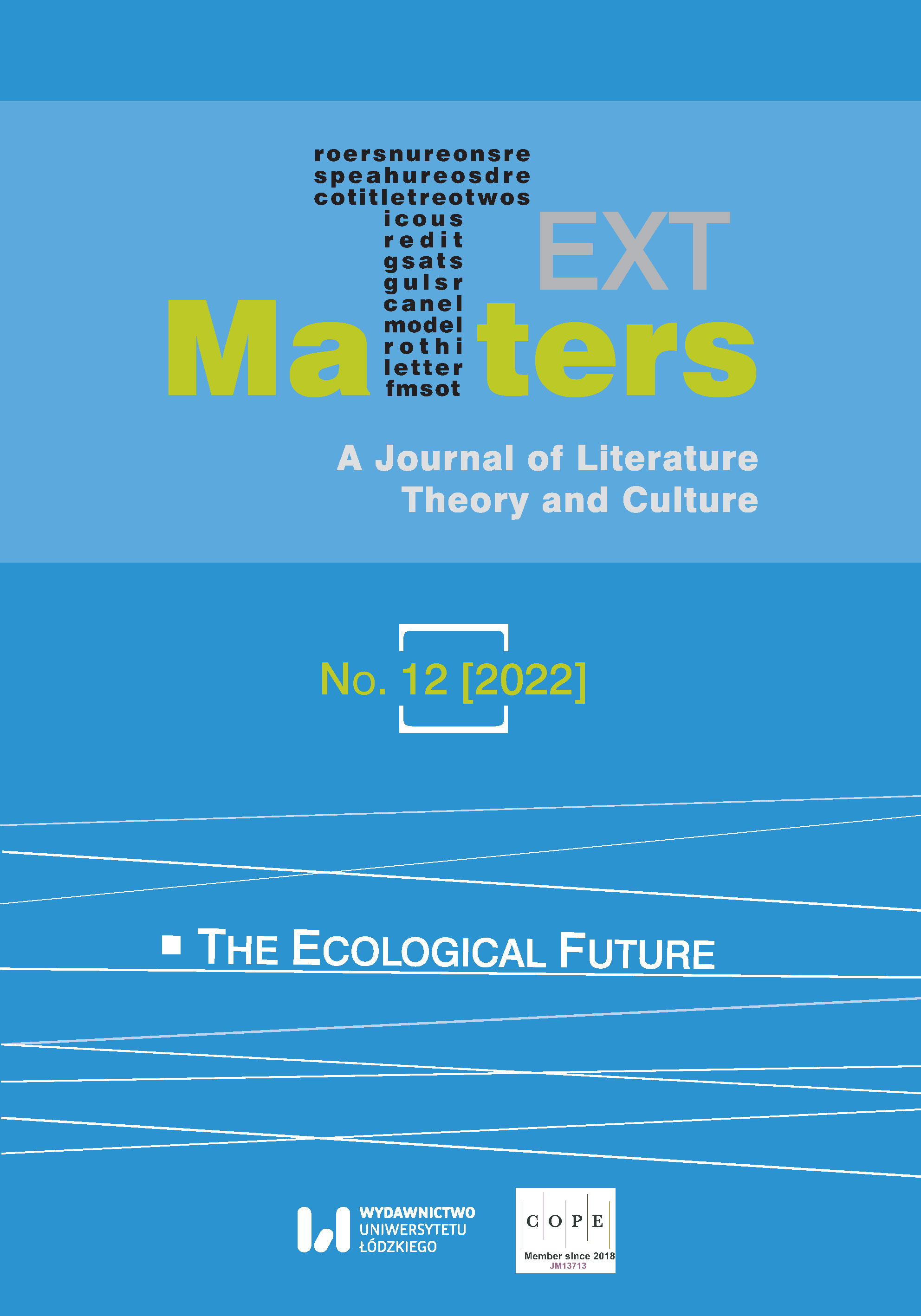Prophesying the End of Human Time: Eco-Anxiety and Regress in J. G. Ballard’s Short Fiction
DOI:
https://doi.org/10.18778/2083-2931.12.10Keywords:
eco-anxiety, J. G. Ballard, climate fiction, science fiction, inner spaceAbstract
Despite being written half a century before the term “eco-anxiety” (Gifford and Gifford) was coined, J. G. Ballard’s disaster fictions can be read in the context of the social psychodynamics of climate change. My aim in this article is to demonstrate that in J. G. Ballard’s fiction, climate catastrophes and the devastation of nature cause the characters to realize that the Earth is not going to be able to sustain human life much longer, and their psychological reaction is either subdued anger or strange numbness. In order to do this, I analyze two short stories by Ballard: “Deep End” (1961) and “Low-Flying Aircraft” (1975) and show how their protagonists are affected by the landscape they inhabit: de-populated wastelands whose wildlife is extinct or mutated. I argue that it is their awareness that human civilization on earth is coming to its end that results in the state of mind akin to eco-anxiety. The characters are immersed in their own inner space and in these stories clocks mark not the passage from past to future but a countdown to the end.
Downloads
References
Anderson, Daniel Gustav. “Natura Naturans and the Organic Ecocritic: Toward a Green Theory of Temporality.” The Journal of Ecocriticism, vol. 4, no. 2, July 2012, pp. 34–47.
Google Scholar
Ballard, J. G. A User’s Guide to the Millennium. Flamingo, 1997.
Google Scholar
Ballard, J. G. “Deep End.” The Complete Short Stories, Flamingo, 2002, pp. 235–43.
Google Scholar
Ballard, J. G. “Low-Flying Aircraft.” The Complete Short Stories, Flamingo, 2002, pp. 828–40.
Google Scholar
Bastian, Michelle. “Fatally Confused: Telling the Time in the Midst of Ecological Crisis.” Environmental Philosophy, vol. 9, no. 1, 2012, pp. 23–48. https://doi.org/10.5840/envirophil2012913
Google Scholar
DOI: https://doi.org/10.5840/envirophil2012913
Bastian, Michelle. “Inventing Nature: Re-writing Time and Agency in a More-Than-Human World.” Australian Humanities Review, vol. 47, 2009, pp. 99–116. https://doi.org/10.22459/AHR.47.2009.10
Google Scholar
DOI: https://doi.org/10.22459/AHR.47.2009.10
Baxter, Jeannette. J. G. Ballard’s Surrealist Imagination: Spectacular Authorship. Ashgate, 2009.
Google Scholar
Clarke, Jim. “Reading Climate Change in J. G. Ballard.” Critical Survey, vol. 25, no. 2, 2013, pp. 7–21. JSTOR, http://www.jstor.org/stable/42751031 accessed 27 Sept. 2020. https://doi.org/10.3167/cs.2013.250202
Google Scholar
DOI: https://doi.org/10.3167/cs.2013.250202
Dini, Rachele. “‘Resurrected from its Own Sewers’: Waste, Landscape, and the Environment in J. G. Ballard’s 1960s Climate Fiction.” ISLE: Interdisciplinary Studies in Literature and Environment, vol. 20, no. 1, Spring 2021, pp. 207–29. https://doi.org/10.1093/isle/isz003
Google Scholar
DOI: https://doi.org/10.1093/isle/isz003
Evans, Rebecca. “Fantastic Futures? Cli-fi, Climate Justice, and Queer Futurity.” Resilience: A Journal of the Environmental Humanities, vol. 4, no. 2–3, Spring–Fall 2017, pp. 94–110. https://doi.org/10.5250/resilience.4.2-3.0094
Google Scholar
DOI: https://doi.org/10.5250/resilience.4.2-3.0094
Farrier, David. “How the Concept of Deep Time Is Changing.” The Atlantic, 31 Oct. 2016, https://www.theatlantic.com/science/archive/2016/10/aeon-deep-time/505922/ accessed 20 Feb. 2021.
Google Scholar
Francis, Samuel. The Psychological Fictions of J. G. Ballard. Bloomsbury, 2011.
Google Scholar
Gasiorek, Andrzej. J. G. Ballard. Manchester UP, 2005.
Google Scholar
Gifford, Eva, and Robert Gifford. “The Largely Unknown Impact of Climate Change on Mental Health.” Bulletin of the Atomic Scientists, vol. 72, no. 5, 2016, pp. 292–97. https://doi.org/10.1080/00963402.2016.1216505
Google Scholar
DOI: https://doi.org/10.1080/00963402.2016.1216505
Hamilton, Tyler. “Climate Change Is Wreaking Havoc on Our Mental Health, Experts Say.” The Star, 28 Feb. 2016, https://www.thestar.com/news/world/2016/02/28/climate-change-is-wreaking-havoc-on-our-mental-health-experts.html accessed 20 Feb. 2021.
Google Scholar
Luckhurst, Roger. “The Angle Between Two Walls”: The Fiction of J. G. Ballard. Liverpool UP, 1997.
Google Scholar
Pringle, David. Earth is the Alien Planet: J. G. Ballard’s Four-Dimensional Nightmare. San Bernardino, 1979.
Google Scholar
Smith, Curtis C. Twentieth Century Science Fiction Writers. St. Martin’s, 1979.
Google Scholar
Tait, Adrian. “Nature Reclaims Her Own: J. G. Ballard’s The Drowned World.” Deep Ends: The J. G. Ballard’s Anthology 2016, edited by Rick McGarth, The Terminal, 2016, pp. 156–64.
Google Scholar
Taylor, Stephanne. “A Visit to the Climate Anxiety Doctor.” The Tye, 4 Aug. 2016, https://thetyee.ca/Culture/2016/08/04/Climate-Anxiety-Doctor/ accessed 20 Feb. 2021.
Google Scholar
Wasdell, David. “The Dynamics of Climate Change. A Case Study in Organisational Learning.” Learning Organization, vol. 18, no. 1, 2011, pp. 10–20. https://doi.org/10.1108/09696471111095966
Google Scholar
DOI: https://doi.org/10.1108/09696471111095966
Published
How to Cite
Issue
Section
License

This work is licensed under a Creative Commons Attribution-NonCommercial-NoDerivatives 4.0 International License.













